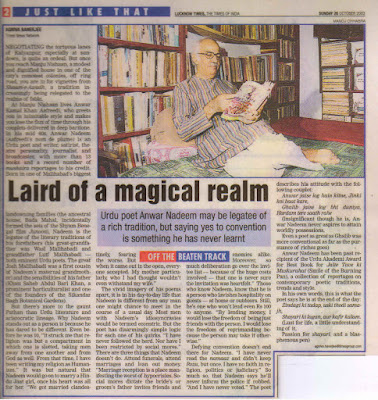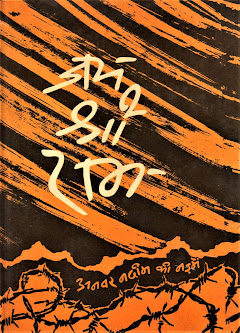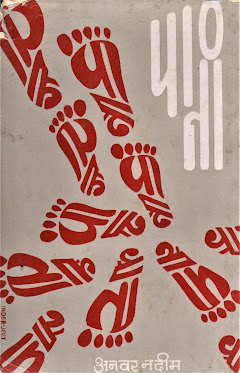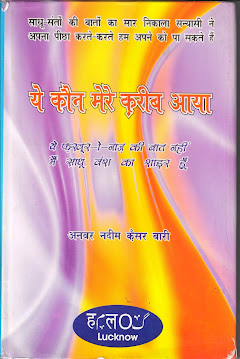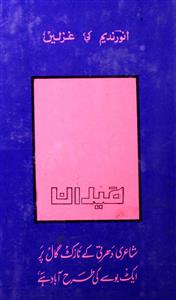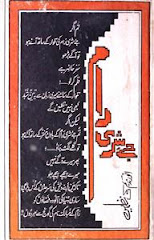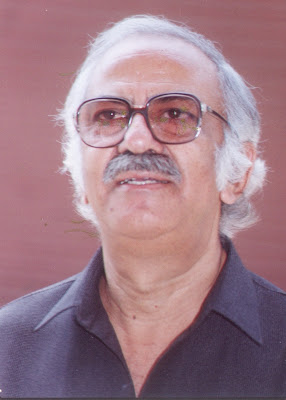
Agniva Banerjee, Lucknow Times, The Times of India, 26 October 2003
Urdu poet Anwar Nadeem may be legatee of a rich tradition, but saying yes to convention is something he has never learnt
Negotiating the tortuous lanes of Kalyanpur; especially at sundown, is quite an ordeal. But once you reach Manju Nishaan, a modest and dignified house in one of the city’s remotest colonies, off Ring Road, you are in for vignettes from Shaam-e-Awadh, a tradition increasingly being relegated to the realms of fable.
At Manju Nishaan lives Anwar Kamal Khan Aafreedi, who greets you in inimitable style and makes you lose the flux of time through his couplets delivered in deep baritone. In his mid 60s, Anwar Nadeem (Aafreedi’s nom de plume) is an Urdu poet and writer, satirist, theatre personality, journalist and broadcaster, with more than 13 books and a record number of mushaira reportages to his credit. Born in one of Malihabad’s biggest landowning families (the ancestral house, Bada Mahal, incidentally formed the sets of the Shyam Benegal film Junoon), Nadeem is the legatee of the literary traditions of his forefathers (his great-grandfather was Wasl Malihabadi and grandfather Lutf Malihabadi – both eminent Urdu poets. The great Josh Malihabadi was a first cousin of Nadeem’s maternal grandmother) and the sensibilities of his father (Khan Saheb Abdul Bari Khan, a prominent horticulturalist and one of the founders of the Sikandar Bagh Botanical Gardens).
But there’s more to the gaunt Pathan than Urdu literature and aristocratic lineage. Why Nadeem stands out as a person is because he has dared to be different. Even before he was 10, “it struck me that religion was but a compartment in which one is slotted, taking men away from one another and from God as well. From that time, I have been writing my religion as Humanism.” It was but natural that Nadeem would go on to marry a Hindu Jaat girl, once his heart was all for her. “We got married clandestinely, fearing the worse. But when it came out in the open, everyone accepted. My mother particularly, who I thought wouldn’t even withstand my wife.”
The vivid imagery of his poems apart, it is in his day-to-day life that Nadeem is different from any man one might chance to meet in the course of a usual day. Most men with Nadeem’s idiosyncracies would be termed eccentric. But the poet has disarmingly simple logic for each one of his quirks. “I have never followed the herd. Nor have I been restricted by social mores.” There are three things that Nadeem doesn’t do. Attend funerals, attend marriages and loan out money. “Marriage reception is a place manifesting the worse of hypocrisies. Social mores dictate the bride’s or groom’s father invite friends and enemies alike. Moreover, so much deliberation go over the invitee list – because of the huge costs involved – that one is never sure the invitation was heartfelt.” Those who know Nadeem, know that he is a person who lavishes hospitality on guests – at home or outdoors. Still, he’s one who won’t lend even Rs 100 to anyone. “By lending money, I would lose the freedom of being just friends with the person. I would lose the freedom of reprimanding may take it otherwise.”
Defying convention doesn’t end there for Nadeem. “I have never read the namaaz and didn’t keep Roza, but once. I have no faith in religion, politics or judiciary.” So much so, that Nadeem says he’ll never inform the police if robbed. “And I have never voted.” The poet describes his attitude with the following couplet:
Anwar jaise log hain kitne, Jinki koi baat kare
Ghalib jaise log bhi duniya, Hardam tere saath rahe
(Insignificant though he is, Anwar Nadeem never aspires to attain worldly possessions,
Even a poet as great as Ghalib was more conventional as far as the pursuance of riches goes)
Anwar Nadeem has been past recipient of the Urdu Akademi Award for Best Book for Jalte Tave ki Muskurahat (Smile of the Burning Pan), a collection of reportages on contemporary poetic traditions, trends and style.
In his own words, this is what the poet says he is at the end of the day:
Zindagi ki tadap, uski thodi samajh,
Shayari ki lagan, aur kafir kalam
(Lust for life, a little understanding of it,
Passion for poetry, and a blasphemous pen)
Urdu poet Anwar Nadeem may be legatee of a rich tradition, but saying yes to convention is something he has never learnt
Negotiating the tortuous lanes of Kalyanpur; especially at sundown, is quite an ordeal. But once you reach Manju Nishaan, a modest and dignified house in one of the city’s remotest colonies, off Ring Road, you are in for vignettes from Shaam-e-Awadh, a tradition increasingly being relegated to the realms of fable.
At Manju Nishaan lives Anwar Kamal Khan Aafreedi, who greets you in inimitable style and makes you lose the flux of time through his couplets delivered in deep baritone. In his mid 60s, Anwar Nadeem (Aafreedi’s nom de plume) is an Urdu poet and writer, satirist, theatre personality, journalist and broadcaster, with more than 13 books and a record number of mushaira reportages to his credit. Born in one of Malihabad’s biggest landowning families (the ancestral house, Bada Mahal, incidentally formed the sets of the Shyam Benegal film Junoon), Nadeem is the legatee of the literary traditions of his forefathers (his great-grandfather was Wasl Malihabadi and grandfather Lutf Malihabadi – both eminent Urdu poets. The great Josh Malihabadi was a first cousin of Nadeem’s maternal grandmother) and the sensibilities of his father (Khan Saheb Abdul Bari Khan, a prominent horticulturalist and one of the founders of the Sikandar Bagh Botanical Gardens).
But there’s more to the gaunt Pathan than Urdu literature and aristocratic lineage. Why Nadeem stands out as a person is because he has dared to be different. Even before he was 10, “it struck me that religion was but a compartment in which one is slotted, taking men away from one another and from God as well. From that time, I have been writing my religion as Humanism.” It was but natural that Nadeem would go on to marry a Hindu Jaat girl, once his heart was all for her. “We got married clandestinely, fearing the worse. But when it came out in the open, everyone accepted. My mother particularly, who I thought wouldn’t even withstand my wife.”
The vivid imagery of his poems apart, it is in his day-to-day life that Nadeem is different from any man one might chance to meet in the course of a usual day. Most men with Nadeem’s idiosyncracies would be termed eccentric. But the poet has disarmingly simple logic for each one of his quirks. “I have never followed the herd. Nor have I been restricted by social mores.” There are three things that Nadeem doesn’t do. Attend funerals, attend marriages and loan out money. “Marriage reception is a place manifesting the worse of hypocrisies. Social mores dictate the bride’s or groom’s father invite friends and enemies alike. Moreover, so much deliberation go over the invitee list – because of the huge costs involved – that one is never sure the invitation was heartfelt.” Those who know Nadeem, know that he is a person who lavishes hospitality on guests – at home or outdoors. Still, he’s one who won’t lend even Rs 100 to anyone. “By lending money, I would lose the freedom of being just friends with the person. I would lose the freedom of reprimanding may take it otherwise.”
Defying convention doesn’t end there for Nadeem. “I have never read the namaaz and didn’t keep Roza, but once. I have no faith in religion, politics or judiciary.” So much so, that Nadeem says he’ll never inform the police if robbed. “And I have never voted.” The poet describes his attitude with the following couplet:
Anwar jaise log hain kitne, Jinki koi baat kare
Ghalib jaise log bhi duniya, Hardam tere saath rahe
(Insignificant though he is, Anwar Nadeem never aspires to attain worldly possessions,
Even a poet as great as Ghalib was more conventional as far as the pursuance of riches goes)
Anwar Nadeem has been past recipient of the Urdu Akademi Award for Best Book for Jalte Tave ki Muskurahat (Smile of the Burning Pan), a collection of reportages on contemporary poetic traditions, trends and style.
In his own words, this is what the poet says he is at the end of the day:
Zindagi ki tadap, uski thodi samajh,
Shayari ki lagan, aur kafir kalam
(Lust for life, a little understanding of it,
Passion for poetry, and a blasphemous pen)
